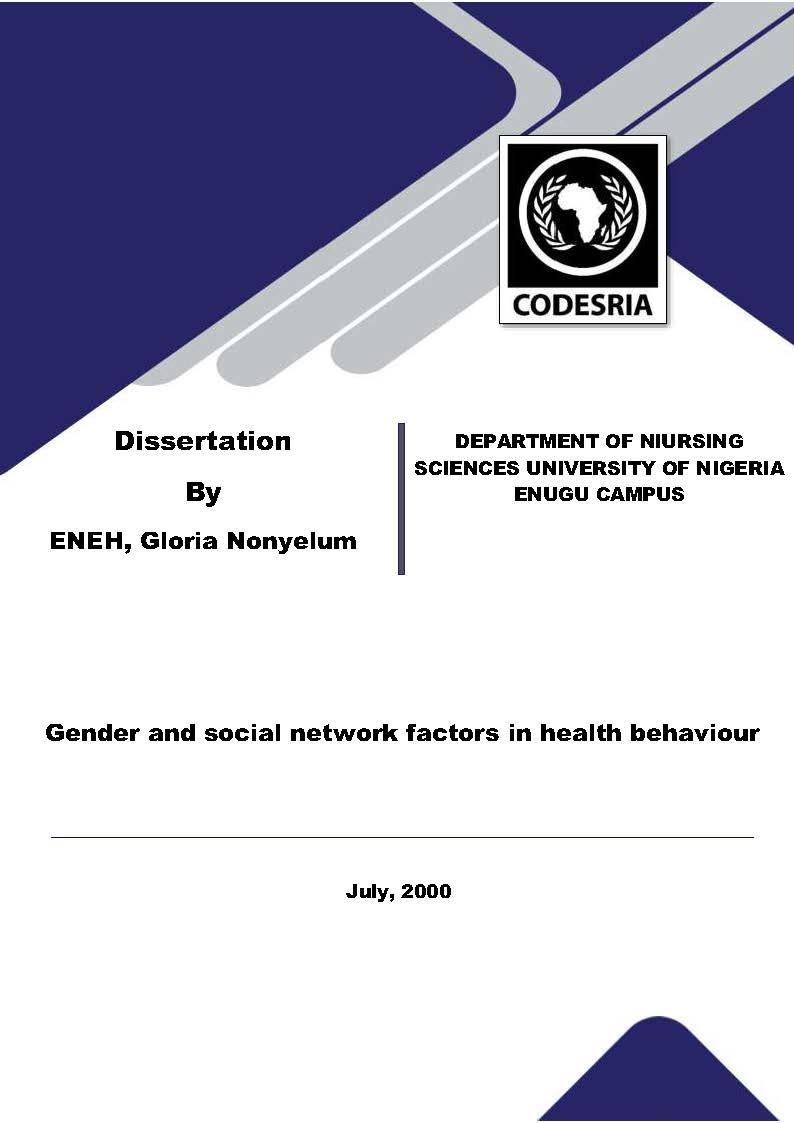Gender and social network factors in health behaviour
Mots-clés :
Gender and social, health behaviour, preventive, significance, NigeriaSynopsis
There has been a world wide campaign to promote health for all through Primat)' Health
Care. Consequently, individuals singly and collectively have roles and responsibilities in
'
promoting feasible preventive action in health. Information on the influence of gender, social
class and reference group pressure on preventive health behaviour may be helpful in developing
policies and programs that will address the issue. Survey method was adopted to collect data from
3899 respondent in the capital cities of four Eastern States of Nigeria. Questionnaire was used
for data generation. The data generated were analyzed using chi-square and tested for significance
at 0.05 significance level. Results showed that gender, social class and reference group pressure
do not influence engagement in health behaviour. It was also found that the attitudes of males and
females in the three social classes towards preventive wealth behaviour was alike and that both
gender sect do not seek advice from referents before engaging in health behaviour. Increased health
educational activities to promote positive health behaviours, combined with improved access to
preventive health services, could change attitudes and conducts that are harmful, resulting in
reduced health risks and high level
wellness.
Téléchargements
Références
Abrams, D., Wetherell, M., Cochrane, S., Hogg, M.A and Tunier, J.C. (1990). Knowing what to think
by knowing who you are: Self-categorisation and the nature of norm formation, conformity and group
polarisation. British Journal of Social Psycho/ogy 29:97-119.;
Ajzen, I. and Fishbein, M. (1980). Understanding Attitudes and Predicting Social Behaviour.
Englewood Cliffs New Jersey: Prentice-Hall.
Appleton, J.S. and Kaye, L.W. (1993). Male Eider Caregivers. In C.L. Williams (ed.) Doing "Women
Work": Men in Non-Traditional Occupations. Newbury Park, Ca: Sage.
Arber, S. and Gilbert, N. (1989). Men: The forgotten Carers. Sociology, 23(1) 111-18.
Aweda, D.A. (1988) "Sociocultural Values, Sex Raies and National Development In Nigeria" Research
for Development. Ibadan: The Nigerian Institute of Social and Economie Research.
Baumann, B. (1961) "Diversities in conceptions of Health and Physical Fitness" Joumal of Health and
Human Behaviour 2 (1): 40.
Bond, John and Bond, Senga (1986). Sociology and Health Care. New York: Churchill Livingstone.
Briscoe, M. (1987). Why do people go to the Doctor? Sex Differences in the Correlation ofG.P
Consultation. Social Science and Medicine 25: 507-513.
Cabral, A.J.R. (1990). Maintaining the Health-For-All Momentum. World Health Forum
(4): 435-439.
Cotterell, John (1996). Social Networks and Social Influences in Adolescence. London: Routledge.
Firestone, Shulamith (1971). The Dia/ectic of Sex. London: Paladin.
Freidson, Elliot (1970). Profession of Medicine: A Study in the Sociology of Applied Knowledge. New
Yorle Dodd, Mead.
Friedman, Marilyn M. (1981) Family Nursing: Theory And Assessment. New York:
Appleton-Century-Crofts.
Goldberg, Steven (1979). Male Dominance: The lnevitability of Patriarc/1y
Sphere Books.
London: Abacus Hartman, H. (1997). The Unhappy Marriage of Marxism and Feminism: Towards a more Progressive Union.
In Nicholson (ed.) The Second Wave: A Reader in Feminist Theory0 New York: Rontledge.
enwood, Melanie, Rimmer, Lesley and Wicks, Malcom (1987) Inside the Family: Changing Rotes of Men
and Women. London: Family Policy Centre. Occasional paper 6.
Hilbert, Morston S (1977). Prevention: Presidential Address. America/! Journal of Public Health
(4): 353-356.
International Women's Health Coalition (1994) Challenging the Culture of Silence: Building
Alliances To End Reproductive Tract Infection. New York: International Women's Health Coalition.
Jowel, Roger and Witherspoon, Sharon (eds.) (1995) British Social Attitudes. London: Gower. Kandal,
Terry K (1988). The Women Question in Classical Sociological Theory. Miami,
Florida: International University Press.
Koos, E.L. (1954) The Health of Regionville. New Yorle Columbia University Press.
Langlie, J.K. (1977). Social Networks, Health Beliefs and Preventive Health Behaviour.
Journal of Health and Social Behaviour 18: 258.
Mastroianni, Anna C., Faden, Ruth and Federman, Daniel (eds) (1994). Women & Health Research:
Ethical and Legal Issues of Including Women in Clinical Studies. Volume 1 Washington, D.C.:
National Academy Press.
Miles, Agnes (1991). Women, Health and Medicine. Philadelphia: Open University Press. Millet, Kate
(1971). Sexual Politics. London: Sphere.
Mitchell, Pamela H and Loustau, Anne (1981). Concepts Basic To Nursing. New York: McGraw-Hill Book
Company.
Morgan, D.H.J. (1996). Family Connections: An Introduction to Family Studies. Cambridge: Polity
Press.
Moser, Caroline O.N. (1991). Gender Planning in the Third World: Meeting Practical & Strategic
Needs. In Rebecca Grant & Kathleen Newland (eds.) Gender and International Relations. Great
Britain: Open University Press.
Murdaugh, Carolyn and Hinshaw Ada Sue (1986). Theological Mode! Testing To Identify
Personality Variable affecting Preventive Behaviour. Nursing Research 35(1): 237-41.






